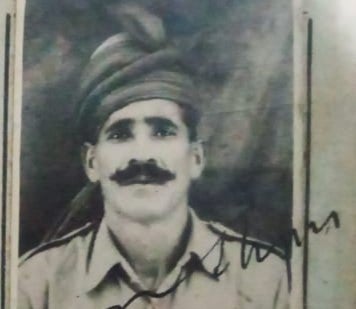Remembrance Day: British Asian pupils feel new sense of belonging after discovering ancestors’ war efforts
‘Now I know that it wasn’t just white British people, it was all of us’: Nadine White finds out how the hidden stories of the Second World War are inspiring a new generation

Born in northwest Pakistan, Mir Sultan Khan served as a sergeant in the 2nd Battalion of the First Punjab Regiment in the British army during the Second World War.
While fighting in Burma he was captured by Japanese forces and held in a prisoner of war camp until 1945. He was later awarded two medals for his service.
For his grandson, Muhammad Tanveer, his grandfather’s service has allowed him a greater sense of connection with British history – and inspired a military career of his own.
Speaking to students at Eden Girls’ School, Waltham Forest – a Muslim school for girls in east London – Mr Tanveer said that the war-effort contributions by ethnic minority Britons must not be forgotten to history.
“His military service is really inspiring for me. I feel more part of the history, I feel more connected – I feel proud,” Mr Tanveer, now a cadet instructor, said.
“This influence and inspiration I took from my grandad – it drove me towards choosing this career, to being a part of the Ministry of Defence.
“This history should come into the spotlight, especially for young generations.”
Mr Tanveer’s own daughter, Roviha, a pupil at the school, said that discovering her great-grandfather’s Second World War contribution has meant that this year’s Remembrance Day commemorations have taken on a new meaning.
“After discovering that my great-grandfather fought in the war, Remembrance has felt more personal for me,” she said.
As part of a project called Remember Together, Asian heritage pupils at two secondary schools in diverse areas of Rochdale and east London are being encouraged to delve into the hidden parts of their family histories.
Detailing the contribution from within their own communities during the Second World War, the project aims to help make Remembrance Day an inclusive moment that brings people together while also highlighting how often ethnic minority contributions to the war effort are overlooked.
Students at Falinge Park High School in Rochdale, Greater Manchester, along with those at Eden Girls’ School, appealed to local people to share their family stories of relatives who served in the Second World War. The students interviewed the descendants of these veterans and documented their stories.
Over 2.5 million soldiers from pre-partition India – what is now India, Pakistan and Bangladesh – served alongside servicemen and women from Africa, the Caribbean and other commonwealth nations.
And yet, all too often, mainstream narratives of the war omit the details of the significant efforts of people from ethnic minority groups.
For Adil Javed, a pupil in Rochdale, discovering his grandfather’s service details gave him a new sense of identity.
“I just feel really proud,” he said, of Muhammad Sadiq Malik Qadri, who fought in Burma in the Second World War. “I’ve got a real sense of belonging, a real sense of identity, because of him – I’ve got a great sense that I belong in this country because I know I’ve got a right to be here – my grandfather fought in a war.”
Shaukat Hussain from east London, speaking about his father who served in north Africa and Italy, said: “I grew up in this country and it was always that refrain of ‘You’re not English, you don’t belong here.’ Well, my father fought for this country – how can I not belong here?”
Meanwhile, Ahsan, a student at Falinge Park High School, said: “Everyone is more connected to World War Two than we thought. Now I know that it wasn’t just white British people, it was all of us.”
The schools partnered with British Future – a charity working for a fair and inclusive Britain. Last year, ahead of Remembrance Sunday, British Future coordinated a joint letter signed by politicians of all parties together with voices from different faiths and from the military, urging that “all who served are fully recognised through better education, commemoration and documentation of our shared history”.
Steve Ballinger, communications director at British Future, said: “We hear a lot about how commemorating our history is difficult and divisive. But it can also bring people together – especially when we think about the history that is shared by people from different backgrounds.
“Remember Together aims to make our national tradition of Remembrance feel relevant and inclusive to everybody in Britain today. We’d like to see it rolled out in schools across the country.”
Subscribe to Independent Premium to bookmark this article
Want to bookmark your favourite articles and stories to read or reference later? Start your Independent Premium subscription today.

Join our commenting forum
Join thought-provoking conversations, follow other Independent readers and see their replies